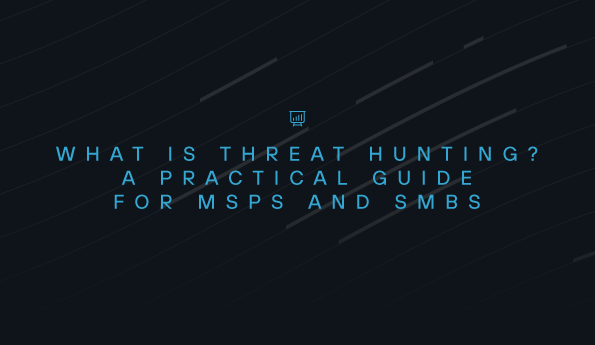How MSPs Build Lasting Client Relationships Through Proactive Operations
Your clients already value your technical expertise and implementation capabilities. But the MSPs who build truly lasting relationships go beyond solving technical problems—they become indispensable business advisors through proactive operations that continuously demonstrate value.
This is the final piece of the "Advise. Implement. Operate." framework we've explored in our previous blogs on risk advisory fundamentals and implementation that drives business outcomes. The Operate phase transforms routine security management into ongoing advisory relationships that create client loyalty, justify premium pricing, and generate organic growth opportunities.
What the Operate Framework Actually Delivers
The Operate phase moves you from reactive technical support to proactive business advisory. Your technical monitoring and maintenance continue protecting client environments, but now you add regular business intelligence and advisory counsel that reinforces your position as an indispensable partner.
Monthly Business Risk Updates:
Instead of sending technical reports when something breaks, you proactively deliver monthly intelligence that helps clients stay ahead of risks:
- Industry threat landscape updates: "Three manufacturing companies in your region were hit by this ransomware variant last month. Here's how our implementations protect you, and what additional precautions we recommend before holiday production ramps up."
- Regulatory and compliance advisory: "New PCI-DSS requirements take effect in six months. Here's what changes for your business and how we'll ensure you're ready without disrupting operations."
- Operational performance in business terms: "Your security operations maintained zero revenue-impacting incidents during peak season, and our compliance monitoring kept you audit-ready for that enterprise customer review."
The difference: You're delivering business insights that influences decisions, not just reporting technical metrics.
Quarterly Strategic Business Reviews:
These reviews go beyond technical status updates to provide business advisory counsel that deepens relationships:
- Business outcome demonstration: Show how security operations supported their revenue growth, how compliance achievements enabled new contracts, and how threat prevention protected customer relationships
- Strategic planning integration: Discuss how security strategy supports their expansion plans, what market positioning advantages their security posture creates, and how to prepare for upcoming business changes
- Proactive risk identification: Flag emerging threats that could affect their business plans before they become problems
Real example: During a quarterly review, you identify that a client's new SOC 2 certification enables them to compete for government contracts. You help them document their security posture for RFP responses—they win a $750K contract they couldn't have pursued six months earlier.
Monthly Risk Updates That Create Value
The monthly cadence creates regular touchpoints that position you as the client's go-to source for security intelligence affecting their business.
Industry Threat Intelligence
Your clients need to understand how emerging threats specifically affect their industry and business model. Generic threat alerts don't enable informed decision-making.
Effective threat briefings connect to business impact:
Traditional approach: "We detected and blocked a new malware variant this week."
Operate framework: "A new ransomware campaign is targeting healthcare providers through compromised vendor portals—the same attack vector that shut down a regional hospital for five days last month. We've verified your vendor access controls are configured to prevent this attack, and we recommend adding MFA requirements for your top-tier suppliers before their annual security reviews."
This positions you as an advisor who understands both the threat landscape and client business priorities.
Regulatory and Compliance Intelligence
Staying ahead of regulatory changes demonstrates advisory value while helping clients maintain competitive advantages.
Real impact example:
When CMMC 2.0 requirements were announced, proactive MSPs didn't wait for clients to ask about compliance. They briefed defense contractors on:
- Timeline for compliance requirements and which contracts would require certification
- Business impact of early preparation vs. waiting
- Estimated investment and ROI through expanded contract eligibility
- Competitive advantage of being certified before competitors
Clients who acted on this intelligence captured new opportunities worth while competitors scrambled to catch up.
Business-Relevant Operational Performance
Transform technical monitoring data into business intelligence that demonstrates ongoing value.
Business leaders understand impact on revenue, customer relationships, and competitive position—not just technical statistics.
Quarterly Business Reviews That Deepen Relationships
Quarterly business reviews provide business advisory counsel that positions you as a strategic partner, not just a service provider.
Effective Review Structure
1. Business context first: Start by understanding what happened in their business this quarter:
- Revenue performance and growth initiatives
- New customer wins or market expansion
- Operational challenges they faced
- Strategic priorities for next quarter
2. Show security alignment: Demonstrate how your operations supported their business objectives:
- How operational stability enabled their peak season success
- How compliance achievements supported their enterprise sales efforts
- How threat prevention protected critical customer relationships
- How security positioning strengthened competitive advantages
3. Identify emerging risks: Flag potential threats to upcoming business plans:
- Industry threats relevant to their expansion plans
- Regulatory changes affecting their target markets
- Competitive intelligence about security requirements
- Technology risks from planned system changes
4. Provide strategic recommendations: Suggest security investments that enable growth opportunities:
- Compliance certifications that unlock new markets
- Security capabilities that differentiate from competitors
- Technology improvements that support business expansion
- Risk management strategies for planned initiatives
From Service Provider to Trusted Advisor
Signs you've achieved advisory positioning through the operate framework:
- Clients call you before making business decisions with security implications
- They include you in strategic planning discussions
- They reference your insights in board meetings and executive conversations
- They introduce you to peers as their "security advisor," not their "IT provider"
- Expansion opportunities arise naturally from trust, not sales pressure
Crisis Management That Proves Your Value
How you handle security incidents defines your advisory relationship more than any other interaction. The operate framework includes incident response focused on business protection.
Beyond technical remediation:
Traditional approach: "We detected malware on three endpoints. Systems quarantined, malware removed, monitoring increased."
Operate framework: "We detected and contained a targeted attack attempting to access customer data. No data was exposed, no customer impact, operations continued normally. Here's what happened, how we protected your business, what we're doing to prevent future attempts, and our recommendation for your customer communication strategy."
The difference: You're managing business risk and reputation, not just technical incidents.
Organic Growth Through Advisory Relationships
The operate framework creates natural opportunities for expansion by deepening client relationships and identifying new ways to support business objectives.
When clients see you as a trusted advisor through regular monthly updates and quarterly reviews, they naturally turn to you for additional guidance:
- Additional locations discovered: Monthly briefings reveal plans for new offices needing security support
- Compliance requirements identified: Quarterly reviews uncover new certifications needed for target markets
- Acquisition support requested: Strategic conversations reveal upcoming acquisitions needing security integration
- Growth initiatives enabled: Business planning discussions identify security needs for expansion
Real example: During a quarterly review, a client mentions they're acquiring a competitor. Because you understand their business strategy and security requirements through regular touchpoints, you immediately propose a security integration plan. The acquisition support generates $75K in additional revenue and deepens the advisory relationship.
Building Your Practice
Implement the Operate framework by enhancing your existing operations with regular advisory touchpoints. You should start with your best relationships, chossing 1 to 3 clients where you have strong trust and acces to leadership:
Month 1: Establish Monthly Updates
- Send first monthly business risk update connecting technical operations to business impact
- Deliver one industry threat briefing relevant to their business
- Provide regulatory update affecting their market
Month 2: Add Proactive Insights
- Share competitive intelligence about security positioning
- Identify one strategic recommendation enabling growth
- Connect ongoing monitoring to business continuity
Month 3: Launch Quarterly Reviews
- Schedule first quarterly strategic business review
- Demonstrate business outcomes from your operations
- Identify expansion opportunity from strategic conversations
Develop Insights Capabilities
The operate framework requires insights capabilities that enable valuable business counsel:
Industry expertise:
- Monitor threat developments affecting your clients' industries
- Track regulatory changes in their markets
- Understand competitive dynamics affecting security positioning
- Develop knowledge of how security decisions affect business outcomes
Practical approach: Pick 2-3 industries where you have multiple clients. Become the expert in those sectors' security challenges, regulatory requirements, and competitive dynamics. This focused expertise enables more valuable monthly updates and quarterly reviews.
Your Advantage
The operate framework transforms your technical expertise into lasting advisory relationships that create sustainable competitive advantage and premium pricing opportunities.
By enhancing your operational excellence with monthly business risk updates and quarterly strategic reviews, you become indispensable to client business success—not just another service provider. This approach creates client loyalty that generates organic growth while justifying premium pricing for ongoing advisory value.
Your technical capabilities provide the credibility foundation. The OPERATE framework gives you the structure to demonstrate that value through regular touchpoints that position you as a trusted business advisor.
Ready to implement the complete "Advise. Implement. Operate." framework that builds lasting advisory relationships?
Download our comprehensive guide: "The MSP's Guide to Risk Advisory" to learn the detailed methodology successful MSPs use to build lasting competitive advantage and command premium pricing through the complete advisory cycle.
See Todyl in Action
Learn how you can protect what you built.
Stay on the Cutting Edge of Security
Subscribe to our newsletter to get our latest insights.



